
Website founded by
Milan Velimirović
in 2006
23:39 UTC


| |
MatPlus.Net  Forum Forum  General General  John Roycroft 50 JT 1978-1979 (with corrections of Ionchev's study) John Roycroft 50 JT 1978-1979 (with corrections of Ionchev's study) |
| |
|
|
|
|
You can only view this page!
| | | (1) Posted by Sarah Hornecker [Tuesday, Jul 10, 2007 03:09]; edited by Sarah Hornecker [07-07-11] | John Roycroft 50 JT 1978-1979 (with corrections of Ionchev's study)
In EG 57 (available online at http://www.gadycosteff.com/eg/eg57.pdf) I read on the tourney John Roycroft 50 JT participated 170 composers of 26 different countries with 287 entries. Is this still world record?
A list of participants can be found on p.204 there so I won't copy it here. The award was greatly changed thereafter, for example, the Ionchev study (still one of the most amazing final positions I have ever seen) that first should get 2nd prize sadly was discarded due to an incorrectness. There were many great ideas that prove incorrect, including Rusinek's 1st prize showing two third of the Babson task with perfect economy (five years before Yarosh showed the full Babson in a direct mate).
In the final award, Genrich Kasparian won 1st prize. His study was set on 6th prize first. It must have been the greatest win in his life (even greater than the USSR championships).
I'd consider it the highest study tourney ever. What do you think?
The final award is available in EG 59 (http://www.gadycosteff.com/eg/eg59.pdf)
Oh, I wished John Roycroft could tell us what he thinks about the tourney now. Maybe somebody can invite him? :-)
Selected Studies:
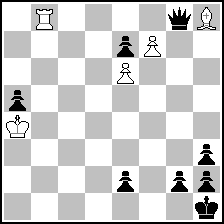 (= 5+8 ) (= 5+8 )
Jan Rusinek
John Roycroft 50 JT 1978-1979
1st prize in provisional award, omitted due to a cook
1.Rb1+ g1Q 2.fxg8Q or 1...e1Q 2.Rxe1+ g1B/S 3.fxg8B/S with longer variations (you can find it in hhdbiii)
Cook: 1...g1Q 2.Rb1 Qd1+! etc
Even worse (for correcting the study): after 2...g1S 3.fxg8B also wins
If it wouldn't be for this, Rb8->a3 and Pe2->c2 could correct the study...
 (= 6+6 ) (= 6+6 )
I. Ionchev (Bulgaria)
John Roycroft 50 JT 1978-1979
2nd prize in provisional award, omitted due to two cooks
1.Rg4+ Re4 2.Rxe4+ Kxe4 3.cxb6 Bd8+ 4.Kg4! bxa2 5.dxc6 a1Q 6.c7+ Qxa8 7.b7 wirh a wonderful draw
Cook: 1...Kxc5 or 1...Kxd5
The study was corrected by me in 2004, see below for all versions.
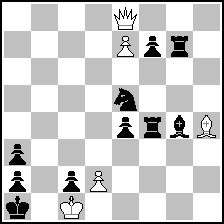 (= 5+10 ) (= 5+10 )
Genrich Moissejevich Kasparian
John Roycroft 50 JT 1978-1979
1st prize (6th prize in provisional award)
1.Qb5 Sd3+ 2.Qxd3 exd3 3.e8Q Be6 4.Qxe6 Rg5!! 5.Bf2! and
5...Rg1+ 6.Be1 Rb4 7.Qxa2+ Kxa2 and white is stalemated
5...Rb5 6.Bd4+ Rb2 7.Qf6! Rxf6 8.Bxf6 and black is stalemated
----------
Four corrections of Ionchev's study (two incorrect ones)
I hope, somebody will be able to compose something out of it.
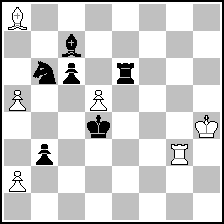 (= 6+6 ) (= 6+6 )
I. Ionchev, incorrect correction by SH 2004/viii/02 (original publication)
1.Rg4+! Re4 2.Rxe4+ etc
Cook: 1...Kxd5
 (= 6+6 ) (= 6+6 )
I. Ionchev, incorrect correction by SH 2004/viii/01 (original publication)
1.Rf4+!! Se4 2.Rxe4+! etc
Cook: 1...Ke3 or 1...Ke5
 (= 6+7 ) (= 6+7 )
I. Ionchev, correction by SH 2004/viii/01 (original publication)
1.Qxg4+ Re4 2.Qxe4+! etc
 (= 6+6 ) (= 6+6 )
I. Ionchev, correction by SH 2004/iv/30, published in Europa Rochade 06/2004
1.Rxe4+!! etc
| | | (2) Posted by Arpad Rusz [Tuesday, Jul 10, 2007 16:28] |
Ionchev's study was not only incorrect but also anticipated by three studies...
1.G.Nadareishvili
Vecherni Leningrad 1965
1/2.Pr
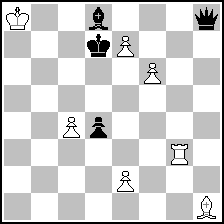 (= 7+4 ) (= 7+4 )
draw
Solution: 1.Bc6+! Kxc6 2.Rg8! Qh1! [2...Qxg8 3.f7! Qxf7 4.exd8N+=] 3.Rg1! Qh8 4.Rg8! positional draw
2.A.Sadikov
Uralski Rabotchi 1968
2.Pr
 (= 6+4 ) (= 6+4 )
draw
Solution: 1.Ng5 [dual 1.Rd2+! Ke8 2.b7+-] 1...Qxg5 2.Rh8+ Ng8 3.Rxg8+ Qxg8 4.b7+ Ke7 5.Bd8+ Qxd8 6.c7!=
A possible correction could be:
2a.A.Sadikov
Uralski Rabotchi 1968
2.Pr
(correction 2007)
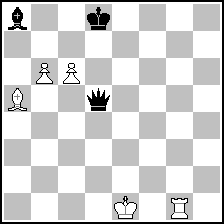 (= 5+3 ) (= 5+3 )
draw
Solution:1.Rg8+! Qxg8 2.b7+ Ke7 3.Bd8+! Qxd8 4.c7!=
3.A.Sadikov
64 1970
2.hm
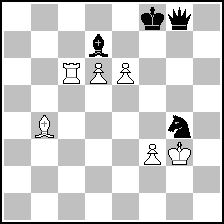 (= 6+4 ) (= 6+4 )
draw
1.Rc8+! Bxc8 2.d7+ Kg7 3.Bf8+! [3.Ba5!? Qxe6 4.Bc3+ unclear] 3...Qxf8 4.e7 Qxf3+ 5.Kxf3 Ne5+ 6.Ke4 Nxd7 7.e8N+!=
A better version could be:
3a.A.Sadikov
64 1970
2.hm
(version 2007)
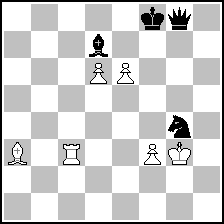 (= 6+4 ) (= 6+4 )
draw
1.Rc8+! [1.exd7? Nf6+ 2.Kf4 Nd5+ 3.Kf5 Kf7 4.Rc8 Qg6+ 5.Ke5 Qe6+ 6.Kd4 Qxd7–+] 1...Bxc8 2.d7+ Kg7 3.Bf8+! Qxf8 4.e7 Qxf3+ [4...Qf5 5.e8Q Bxd7 6.Qe7+ Kg6 7.fxg4=] 5.Kxf3 Ne5+ 6.Ke4 [6.Kf4? Ng6+ 7.Kg5 Bxd7–+] 6...Nxd7! 7.e8N+!=
I have found another 10 studies with this unusual fork. Sadly, many of them are cooked.
| | | (3) Posted by Sarah Hornecker [Tuesday, Apr 22, 2008 22:07] |
And now the strange point!
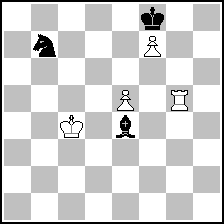 (= 4+3 ) (= 4+3 )
B. Kuzmanovic
Politiken 1957
White wins
1.Kd4! Bh7 2.e6 Sd8! 3.Rg8+ Bxg8 4.e7+!! wins
Now what is this? Does this count as a predecessor?
| | | (4) Posted by Arpad Rusz [Thursday, Apr 24, 2008 00:35]; edited by Arpad Rusz [08-04-24] |
Yes, it does. And almost every follower adds something new to that basic idea. What a nice chain of studies!
| | | (5) Posted by Roberto Stelling [Sunday, Apr 27, 2008 07:26]; edited by Roberto Stelling [08-04-27] |
What about this one by Pal Benko ?
Magyar Sakkelet, 1987
1st Prize
+
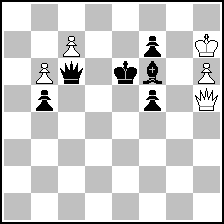 (= 5+6 ) (= 5+6 )
1.Qd1! Qa8
2.Qd8 Bxd8
3.b7 Qxb7
4.cxd8N+ Ke7
5.Nxb7 Kf8
6.Nc5 f4
7.Nd7+ Ke7
8.Kg7 f3
9.Nf6 f2
10.Nd5+ Ke6
11.Ne3
Shouldn't it be on this series as well ?
| |
No more posts |
MatPlus.Net  Forum Forum  General General  John Roycroft 50 JT 1978-1979 (with corrections of Ionchev's study) John Roycroft 50 JT 1978-1979 (with corrections of Ionchev's study) |
|
|
|
 ISC 2024
ISC 2024 Forum
Forum  General
General  John Roycroft 50 JT 1978-1979 (with corrections of Ionchev's study)
John Roycroft 50 JT 1978-1979 (with corrections of Ionchev's study) 


